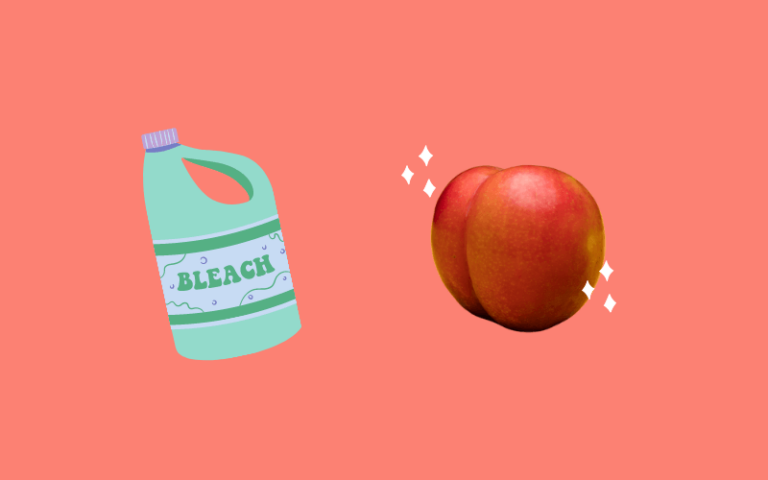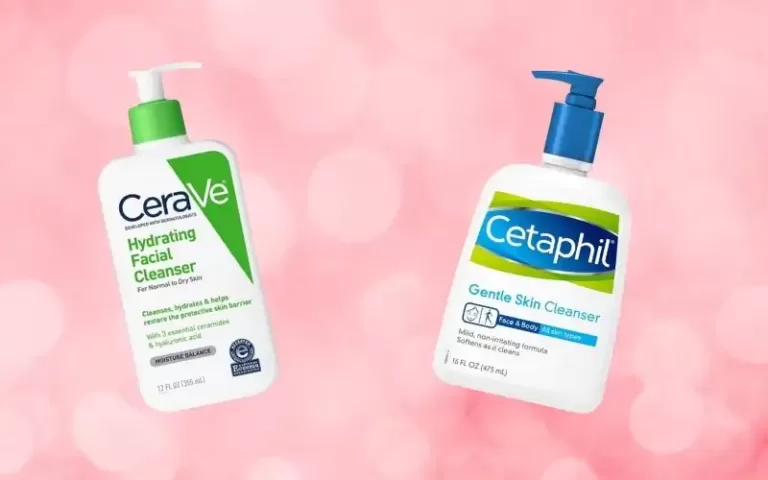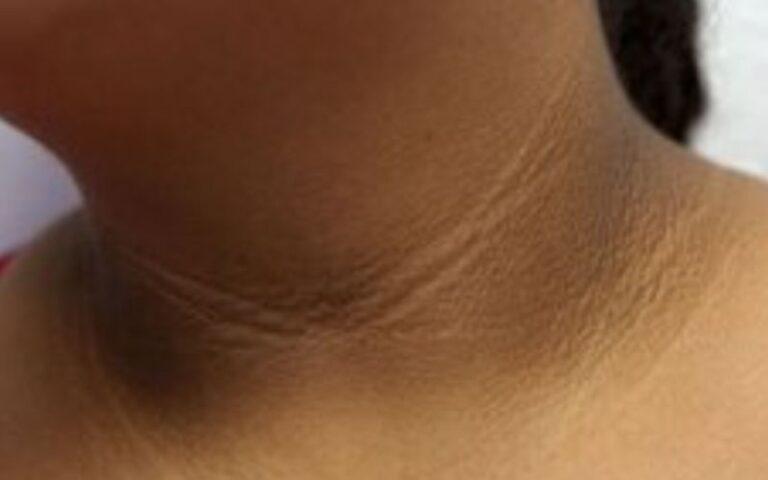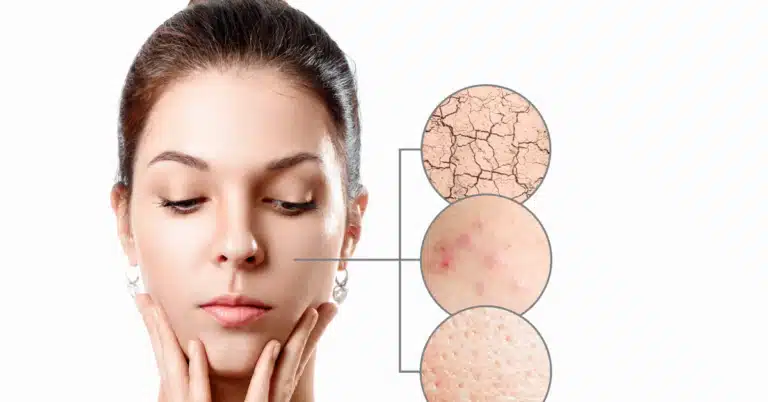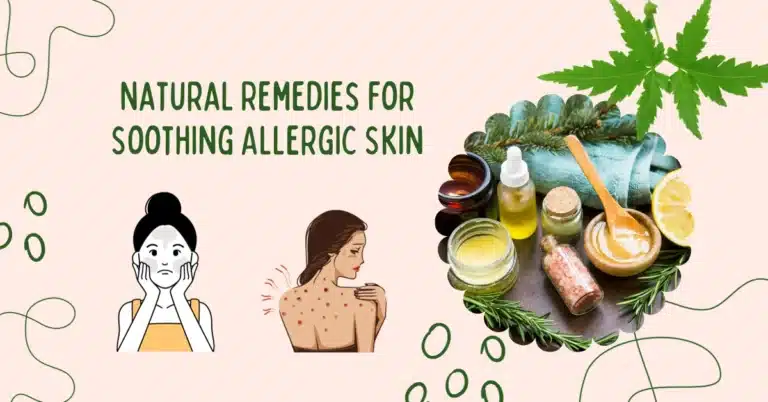Folliculitis Self-Care Tips: Home Remedies To Get A Radiant Skin

Folliculitis, a common skin condition characterized by the inflammation of hair follicles, can be an uncomfortable and unsightly issue to deal with. It can cause redness, itching, and small, pus-filled bumps on the skin. While medical treatment may be necessary in severe cases, there are several natural, herbal, and DIY remedies that you can try at home to alleviate the symptoms of folliculitis and achieve radiant, healthy skin.
In this article, we’ll share with you some of the most effective home remedies and self-care tips for folliculitis that you can easily try at home. We will also explore various lesser-known ingredients to help you combat this skin condition effectively.
Table Of Contents
- Natural Remedies For Folliculitis
- Herbal Treatments For Folliculitis
- DIY Remedies For Folliculitis
- Maintaining Proper Hygiene To Prevent Folliculitis
- Tips For Achieving A Radiant And Healthy Skin
- Wrapping Up
Natural Remedies For Folliculitis
1. Aloe Vera Gel
Aloe vera possesses soothing and anti-inflammatory properties that can provide relief from folliculitis.
Apply fresh aloe vera gel directly to the affected areas and leave it on for 15-20 minutes before rinsing off with lukewarm water.
2. Oatmeal Bath
Oatmeal has anti-itch and anti-inflammatory properties that can help reduce discomfort caused by folliculitis.
Add a cup of finely ground oatmeal to your bathwater and soak in it for 15-20 minutes. Gently pat your skin dry afterward.
An oatmeal bath can be soothing and beneficial for relieving vaginal and vulvar itching caused by folliculitis.
3. Calendula Extract
Calendula is known for its antimicrobial and anti-inflammatory properties.
Mix a few drops of calendula extract with coconut oil. Apply this mix to the affected areas twice daily for relief.
Else, infuse dried calendula flowers in a carrier oil (jojoba or almond oil) for a few weeks. Apply the infused oil to the affected areas to relieve symptoms and promote skin healing.
4. Witch Hazel
Witch hazel acts as an astringent and can help soothe irritated skin.
Apply witch hazel extract to the affected areas using a cotton pad and leave it on for 10-15 minutes before rinsing off.
5. Apple Cider Vinegar
Mix apple cider vinegar with an equal amount of water. Apply this mix to the affected area using a cotton ball. Let it sit for 15 minutes before rinsing off.
Apple cider vinegar possesses properties that are anti-inflammatory and antimicrobial, which can aid in fighting bacteria and preventing infection.
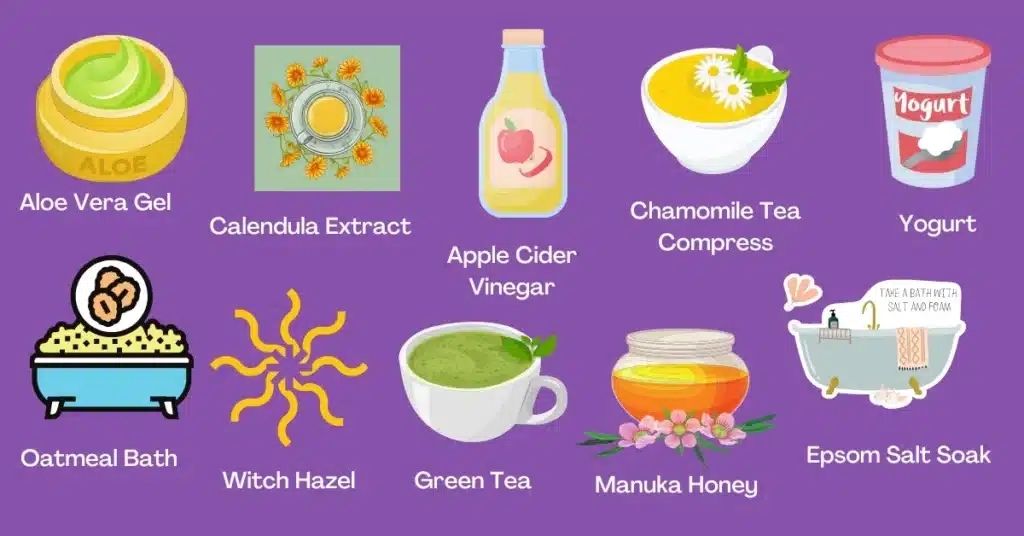
6. Yogurt
The probiotics present in yogurt can promote healthy skin and help reduce inflammation.
Apply plain, unsweetened yogurt to the affected areas and leave it on for 15-20 minutes before rinsing off with lukewarm water.
7. Chamomile Tea Compress
Prepare a strong cup of chamomile tea and allow it to cool. Dip a clean cloth or cotton ball into the tea and apply it as a compress to the affected areas for 10-15 minutes.
Chamomile possesses properties that are anti-inflammatory and soothing, which can assist in decreasing redness and inflammation linked to folliculitis.
8. Epsom Salt Soak
Add a cup of Epsom salt to lukewarm bath water and soak in it for 15-20 minutes. Epsom salt can help reduce inflammation and soothe the skin.
9. Manuka Honey
Manuka honey possesses antibacterial properties and can help fight the infection associated with folliculitis.
Apply a thin layer of Manuka honey to the affected areas and leave it on for 15-20 minutes before rinsing off.
10. Green Tea
Prepare a cup of green tea, allow it to cool, and apply it to the affected areas using a cotton ball or cloth. Green tea has antioxidants that can help reduce inflammation and soothe the skin.
Herbal Treatments For Folliculitis
1. Goldenseal Extract
Goldenseal contains berberine, a compound with antimicrobial properties. Mix a few drops of goldenseal extract with a carrier oil and apply it to the areas affected by folliculitis twice daily for relief.
2. Echinacea
Echinacea has immune-stimulating properties that can aid in the healing of folliculitis. Take echinacea supplements or drink echinacea tea daily to support your immune system.
Echinacea is believed to have potential benefits in managing herpetic folliculitis, a condition characterized by inflammation of hair follicles caused by the herpes virus.
3. Myrrh Essential Oil
Myrrh essential oil possesses antimicrobial and anti-inflammatory properties. Dilute a few drops of myrrh oil with a carrier oil and apply it to the areas affected by folliculitis twice daily.
4. Burdock Root
Burdock root is believed to have anti-inflammatory properties and can help purify the blood. Drink burdock root tea or take burdock root supplements to promote skin health.
5. Grapefruit Seed Extract
A grapefruit seed extract has antimicrobial properties that can help fight infection-causing folliculitis. Mix a little amount of grapefruit seed extract with water and apply the mixture to the affected areas using a cotton ball.
6. Licorice Root
Licorice root possesses anti-inflammatory properties that can help reduce redness and inflammation associated with folliculitis. Brew licorice root tea and use a cotton ball or cloth to apply the mixture to the affected areas.
7. Red Clover
Red clover is known for its blood-cleansing properties. Drink red clover tea or take red clover supplements to support skin health.
8. Horsetail Extract
Horsetail extract is rich in silica, which can promote healthy skin. Apply horsetail extract to the affected areas twice daily for relief.
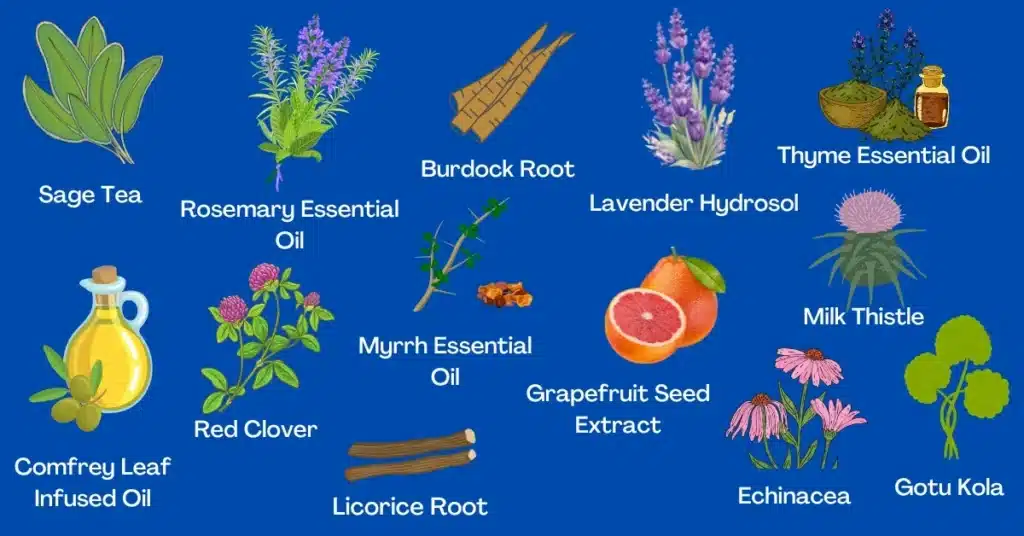
9. Milk Thistle
Milk thistle possesses antioxidant properties that can support liver health, which in turn may benefit the skin. Take milk thistle supplements as directed.
10. Gotu Kola
Gotu kola is believed to have wound-healing properties and can aid in the regeneration of skin cells. Take gotu kola supplements or apply gotu kola cream to the affected areas for relief.
11. Thyme Essential Oil
Thyme essential oil possesses antibacterial properties. Mix a little amount of thyme essential oil with a carrier oil, such as almond or jojoba oil; apply it to the affected area. Leave it on for 20 minutes before rinsing off.
12. Lavender Hydrosol
Lavender hydrosol is a gentle and soothing herbal remedy. Spray lavender hydrosol directly onto the affected areas or apply it using a cotton ball. Leave it on without rinsing.
13. Rosemary Essential Oil
Rosemary essential oil has antimicrobial properties that can help eliminate bacteria causing folliculitis. Mix a few drops of rosemary essential oil with a carrier oil and apply liberally to the affected area. Leave it on for 20 minutes before rinsing off.
14. Sage Tea
Brew a cup of sage tea, let it cool, and use it as a rinse for the affected areas. Sage has antimicrobial properties and can help reduce inflammation.
15. Marshmallow Root Paste
Grind dried marshmallow root into a fine powder and combine it with water to create a paste. Apply the paste to the affected areas and leave it on for 15-20 minutes before rinsing off. Marshmallow root can help soothe inflamed skin.
16. Comfrey Leaf Infused Oil
Infuse dried comfrey leaves in a carrier oil for a few weeks. Apply the infused oil to the affected areas to reduce inflammation and promote skin healing.
DIY Remedies For Folliculitis
1. Honey and Cinnamon Mask
Mix equal parts honey and cinnamon powder to form a paste. Apply the mask to the affected areas and leave it on for 15-20 minutes before rinsing off.
2. Baking Soda Scrub
Blend one tablespoon of baking soda with enough water to form a paste. Gently scrub the affected areas with the mixture for a few minutes before rinsing off.
3. Tomato Juice Toner
Extract juice from a ripe tomato and apply it to the affected areas using a cotton ball. Leave it on for 10-15 minutes before rinsing off.
4. Fenugreek Seed Paste
Grind fenugreek seeds into a fine powder and combine it with water to form a paste. Apply the paste to the affected areas and leave it on for 20-30 minutes before rinsing off.
5. Cucumber and Mint Face Pack
Blend cucumber and mint leaves into a smooth paste. Apply the pack to the affected areas and leave it on for 15-20 minutes before rinsing off.
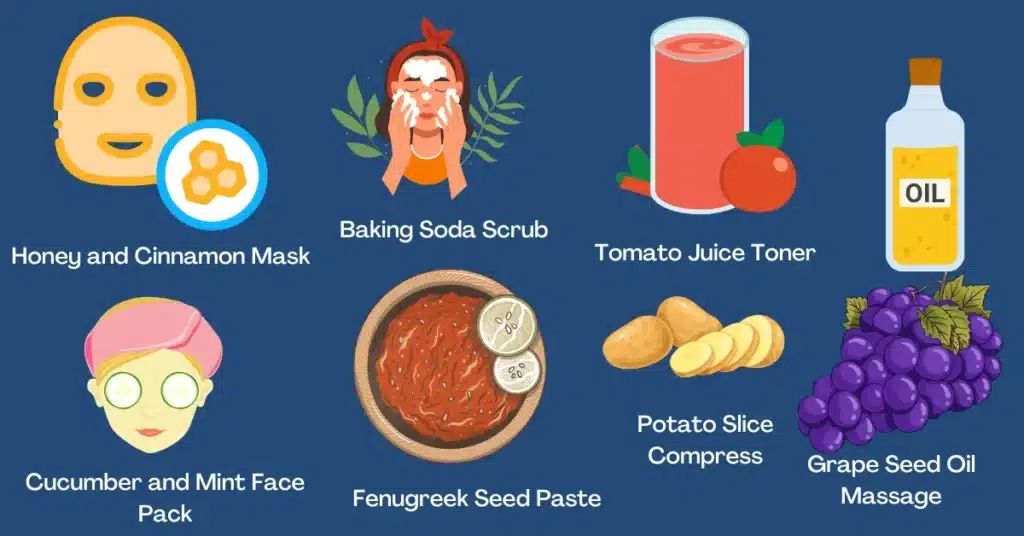
6. Potato Slice Compress
Cut raw potato into slices and apply the slices as a compress to the affected areas for 10-15 minutes. Potatoes have soothing properties that can provide relief.
You may also place chilled potato slices over the affected areas.
7. Papaya Enzyme Mask
Mash ripe papaya and apply it as a mask to the affected areas. Leave it on for 15-20 minutes before rinsing off. Papaya contains enzymes that can help exfoliate the skin gently.
8. Rice Water Rinse
After cooking the rice, collect the water used for rinsing the rice. Allow it to cool, and use it as a final rinse after washing your face.
9. Egg White Mask
Separate an egg white and whisk it until frothy. Apply the frothy egg white to the affected areas and leave it on until it dries before rinsing off.
Egg white can help tighten the pores and reduce inflammation.
10. Grape Seed Oil Massage
Massage grape seed oil onto the affected areas in gentle, circular motions for a few minutes. Leave it on for 30 minutes before rinsing off.
Maintaining Proper Hygiene To Prevent Folliculitis
Maintaining proper hygiene is crucial to prevent folliculitis and achieve radiant skin. Firstly, it is essential to keep the affected areas clean by washing them gently with mild antibacterial soap or cleanser.
Avoid using harsh scrubbing tools that can irritate the skin further. Additionally, always ensure that towels, clothing, and bedding are clean and regularly changed to prevent the accumulation of bacteria.
Moreover, it is important to avoid sharing personal items such as razors, towels, or clothing with others, as this can increase the risk of bacterial transfer. When shaving, use a clean razor and replace it frequently to avoid bacteria buildup.
It is also recommended to moisturize the skin after shaving or waxing to prevent dryness and irritation. Furthermore, wearing loose-fitting clothing made from breathable fabrics like cotton can help reduce sweat and friction on the skin, which are common triggers for folliculitis.
Tips For Achieving A Radiant And Healthy Skin
- Follow a consistent skincare routine: Establishing a daily skincare regimen is crucial for maintaining healthy and radiant skin. Cleanse your face two times a day with a gentle cleanser suitable for your skin type. After cleansing, follow with toning and moisturizing.
- Protect yourself from the sun: Sun exposure can induce premature aging, dark spots, and other skin issues. Always remember to wear sunscreen with a minimum SPF of 30, even on cloudy days, and don’t forget to cover exposed areas with protective clothing.
- Stay hydrated: Ensuring an adequate intake of water is crucial for maintaining overall health, including your skin’s health. Proper hydration helps flush out toxins and keeps your skin moisturized from within.
- Eat a balanced diet: Nourish your skin by consuming a diet rich in fruits, vegetables, lean proteins, whole grains, and healthy fats like avocado and nuts.
- Over-the-counter remedies: There are different over-the-counter choices to manage folliculitis symptoms. You can find creams or ointments with benzoyl peroxide, salicylic acid, or Hibiclens, which reduce inflammation, control bacteria, and ease discomfort. You can also use antiseptic solutions to clean the affected areas and prevent infection.
Wrapping Up
Remember, while these home remedies may provide relief from the symptoms of folliculitis, it’s important to consult with a dermatologist for a proper diagnosis and appropriate medical treatment if your condition persists or worsens. Self-care tips and remedies can complement medical treatment but should not be used as a substitute for professional advice.
By incorporating these natural, herbal, and DIY remedies into your self-care routine, you can take proactive steps towards achieving radiant skin and alleviating the discomfort caused by folliculitis. Experiment with these remedies, be patient and discover which ones work best for you. Here’s to healthier, happier skin!
FAQs
Q: What are some effective home remedies for treating folliculitis?
A: Some effective home remedies for treating folliculitis include applying warm compresses, using tea tree oil, using aloe vera gel, and keeping the affected area clean and dry.
Q: How can I improve my skin’s radiance while managing folliculitis at home?
A: To improve your skin’s radiance while managing folliculitis, you can focus on overall skin care practices such as gentle cleansing, regular exfoliation, moisturizing, and protecting your skin from the sun. Additionally, maintaining a healthy lifestyle with a balanced diet and proper hydration can also contribute to radiant skin.
Q: Are there any natural remedies that can help reduce inflammation and redness associated with folliculitis?
A: Yes, some natural remedies that can help reduce inflammation and redness associated with folliculitis include applying chamomile tea compresses, using apple cider vinegar diluted with water, and applying a mixture of turmeric and honey to the affected area.
Q: What self-care tips can I follow to promote healing and prevent further folliculitis flare-ups?
A: To promote healing and prevent further folliculitis flare-ups, it is important to keep the affected area clean and dry, avoid picking or scratching the affected area, wear loose-fitting clothing, avoid sharing personal items, and regularly wash towels, bed sheets, and clothing.
Q: Can specific dietary changes or supplements aid in improving skin health and managing folliculitis symptoms?
A: While there is no specific diet or supplement that can cure folliculitis, maintaining a healthy diet with copious vitamins, minerals, and antioxidants can support overall skin health. Eating foods like fruits, vegetables, whole grains, and lean proteins can be beneficial for skin health.
Q: Are there any precautions I should take when using home remedies for folliculitis?
A: When using home remedies for folliculitis, it is crucial to perform a patch test before applying any new ingredient to check for potential allergies or adverse reactions. If you experience any worsening of symptoms or discomfort, stop use and consult a healthcare professional.
Q: How long does it typically take for home remedies to show results in alleviating folliculitis symptoms?
A: The time it takes for home remedies to show results in alleviating folliculitis symptoms can vary depending on the individual and the severity of the condition. Generally, consistent use of home remedies for a few days to weeks may be required to observe improvements.
Q: Can regular exercise and stress management techniques contribute to better skin condition in folliculitis cases?
A: Yes, regular exercise and stress management techniques can contribute to better overall skin condition, including in cases of folliculitis. Exercise promotes healthy blood circulation, which can support skin health. Additionally, stress management techniques can help reduce stress-related inflammation that may exacerbate folliculitis.
Q: Are there any DIY skincare routines or practices that can complement home remedies for folliculitis?
A: Yes, incorporating a DIY skincare routine can complement home remedies for folliculitis. This may include gentle cleansing, exfoliation using natural ingredients like sugar or oatmeal, applying natural masks or poultices, and using soothing ingredients like cucumber or green tea on the affected area.
Q: What are some common mistakes to avoid when attempting home remedies for folliculitis?
A: Some common mistakes to avoid when attempting home remedies for folliculitis include excessive scrubbing or harsh cleansing, using irritant or allergenic substances, sharing personal items that may spread bacteria, and neglecting to consult a healthcare professional if symptoms worsen or persist.
References
https://www.healthline.com/health/beauty-skin-care/bumps-after-waxing#otc-products
https://www.lybrate.com/topic/folliculitis-5-ayurvedic-remedies/c673c047faa49b25f2ff4fc175f10efd
https://www.welllivingideas.com/15-natural-home-remedies-for-folliculitis-cure/
https://www.epainassist.com/skin/is-folliculitis-contagious-and-how-to-get-rid-of-it
